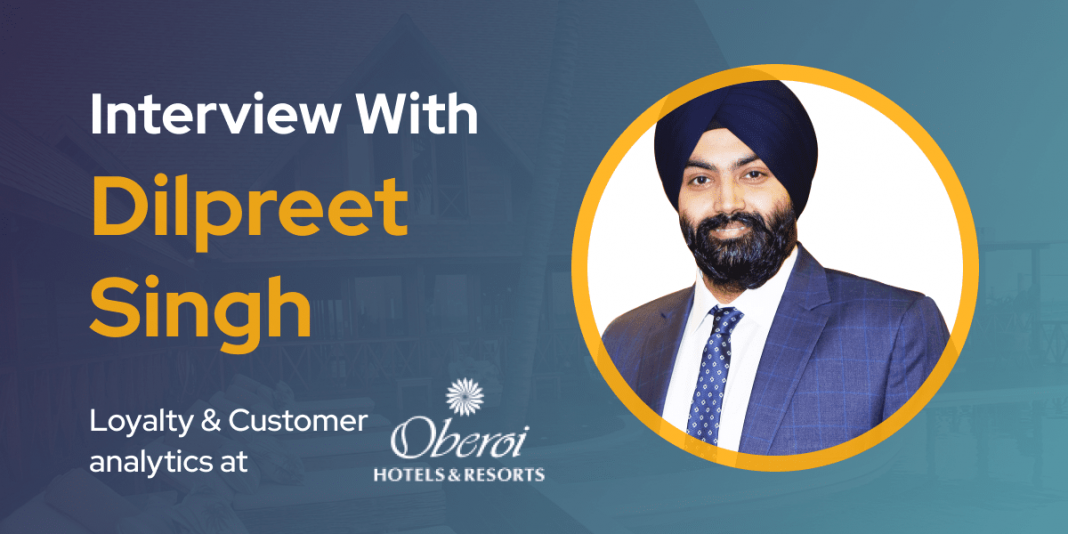Hi Dilpreet, tell us about yourself, your background?
I am a seasoned professional with over 16 years of experience across varied industries like Hospitality, QSR, Retail, and BFSI. I am currently heading the CRM and Loyalty vertical for the flagship brand Oberoi Hotels & resorts and responsible for driving the repeat business through a direct channel by focusing on data-driven marketing strategies.
Before joining Oberoi Hotels & Resorts, I was associated with Jubilant food works, the largest food service company in India, which holds the master franchisee for Domino’s Pizza in India, Nepal, Sri Lanka, and Bangladesh, and also for Dunkin’ Donuts in India as the CRM lead, where I was responsible for increasing order frequency and driving footfalls at the store.
I have also been associated with American Express in the account management profile, catering to top clients in North America, ANZ, and EMEA region.
In 2020, I was recognized as one of the ‘top 30 under 40’ Loyalty professionals by the Loyalty Magazine, UK, and have been part of numerous CX conferences and summits.
Online commerce was booming in 2020, and so did consumer reviews. – How can brands better utilize this data to improve their customers’ experience?
Online reviews have actually become a moment of truth for the consumers as they trust them more than the brands’ paid commercials or digital ads. It also helps the brand judge the customers’ sentiment about their products and then improve their services.
Today’s consumers are more tech-savvy and less brand loyal than previous generations. Millennials and Generation Z have serious spending power, and brands can’t afford to ignore the needs of these empowered, demanding consumers. Specifically, in and e-commerce environment where face-to-face interaction is almost nil, brands must rely on digital data to create a unified view of the customer to personalize the experience.
Brands need to invest in basic infrastructure and new technologies to get a better sense of the customer data which can be used to enhance the customer experience and driving long-term loyalty. A recommendation engine is the best example where the buying or browsing pattern of the customer is captured and analyzed. Then with the help of the technology, the best matched items are shown to them.
What is one element that must always be considered when working on a CXM (customer experience management) strategy?
Customer experience is actually a Value proposition that includes Product quality, service efficiency, and ease of navigating the website or app. Brands need to understand that customer experience is the journey and not the destination; hence it needs to be improved and optimized on an ongoing basis.
Some of the key elements to be considered while designing the CXM strategy are listed below.
- Identify the problem by putting yourself in the consumer’s shoes. The most common mistake which brands make is taking a decision basis a meeting that happens in their conference room without understanding the real problem faced by the consumer. Talk to your customers, read their feedback\comments and, identify the touchpoint with a high dropout rate or negative feedback and then work on that area.
- Empathy gives you a competitive edge – Empathy is the ability to have a deep emotional understanding of another’s feelings or problems. When CX professionals are empathic, they can nurture genuinely and create connections with customers on a very human level.
- CX is more about people and not technology – To effectively manage CX, brands should not get distracted by newly available technology. Customer centricity flows from top to bottom. No matter how good a product you have, if your policies and processes are not customer-centric, you will only gain sales and not a relationship.
- Good Customer Experience can only be delivered through good employee experience. Invest in your people and their growth so that they can go out of their way to deliver a seamless customer experience. Bands need to build a culture where employees should act like owners and not employees. Do you think personalization and customer-centricity are going to become increasingly more relevant in the coming year? How so?
There’s no second thought to it. The digital revolution has changed the way people do – and respond to – marketing. Personalization means knowing about your customers and reaching them with what they intend to buy and listen to.
Personalization is important for the customers and the brands and can improve their conversion rates and ROI by being relevant. A Deloitte study also found that 36% of customers are interested in buying personalized products, and 48% said they would be willing to wait longer to receive them.
A survey by Evergage has found that marketers also see the value of personalization: 96% of respondents felt that it helped them advance customer relationships, and 88% said that they perceived a measurable lift in business results. 61% also said that personalization helped them deliver a better customer experience.
Data and automation hold is the key to enforce personalization and get more out of your relationship with the customers. For example – based on the data like browsing history, past purchases, and preferences, brands can customize and add relevance to the newsletter for every customer.
What are some of the ways companies can strive to eliminate the CX Gap?
The first and foremost prerequisite is to break the silos within the organization, and each department needs to work towards giving a seamless experience to the customer. A customer is dealing with a brand and not the teams or departments; hence the onus lies with everyone in the organization.
I believe in eliminating or mitigating the CX gap; brands need to focus on the below points.
Enforce Customer-centric mentality – The culture must shift from being product-centric (or even sales-centric) to being customer-centric. Customer-centric culture means there are no discussions, decisions, or designs without bringing in the customer voice, without first asking: How will this impact the customer? What value will it deliver for the customer? How will this help the customer?
Keep it Simple and crisp – Often, brands go overboard to collect more data without realizing how they will use it. For example, while filling the form, the customer is asked for birth date and age, which is unnecessary and time-consuming.
Empower your employees – Happy employees make the customers happy. Invest in the culture and training of your employees, empower them to make decisions without making the customer wait or follow up.
What’s the most insightful book you read in 2020?
Rework by Jason Fried – Reimagine the work you do.
It gives you a different perspective towards your work and the things you do at work.
Dilpreet’s predictions for the future of CX
What are your predictions for trends in customer experience in the coming year?
You can buy growth but not retention – Brands will need to focus on retention through superior customer experience to build loyalty and cut down on acquisition costs.
Experience will overtake price and quality in importance to consumers – Consumers value great customer experience more than the price and are ready to pay a premium for a good experience.
Customer experience will be channel agnostic – With easy access to smartphones and other smart devices, customers can engage with the brands anytime and anywhere; hence brands need to develop a strong Omnichannel presence to serve the customers better.
Strike a balance between personalization and privacy – With so many data breach cases in the recent past, brands need to reduce the friction between customer expectation and the technology and safeguard their data and privacy.






